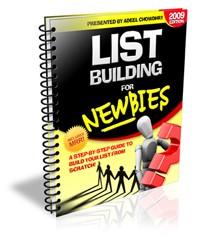 License Type: Private Label Rights
License Type: Private Label Rights  File Size: 700 KB
File Size: 700 KB File Type: ZIP
File Type: ZIP
 SKU: 27387
SKU: 27387  Shipping: Online Download
Shipping: Online Download
Ebook Sample Content Preview:
One thing that many people sometimes overlook is that a good list is like a relationship - it takes work to maintain it. If you stop having dealings with your list for a long period of time, they're likely to forget you, and then when they receive an email from you will be thinking,
"Hey, who on earth is this guy and why is he emailing me?"
While you definitely want to avoid letting your list lapse into inactivity, you also want to avoid over-saturating your list with emails. Starting to send emails every couple of hours would be a very bad idea, especially if they're all mostly just sales pitches.
Important Advice: A good approach is to never send two sales pitches in a row. Space them out to maybe 1 sales pitch for every 4 to 5 emails, and in between, be sure to include freebies or information that is valuable.
If you develop a regular schedule of maybe emailing your list twice a week or so, and space out your sales pitches too, then you're on the right track. If the emails you send in between as 'fillers' contain great info and freebies, then you'll even find that your subscribers are actually eager and waiting to hear from you at your next scheduled time.
Thus, your relationship with your list can flourish, and they'll be much more open to any suggestions of purchases that you might make.
Catering to the Needs of Your Subscribers
Just now, we covered briefly how your 'filler' emails should be providing freebies and information that is of value to your subscribers. Truth is, this is just part of a much larger picture that revolves around the benefits of appealing to subscribers.
To be completely honest, everything that you send out to your list should cater to the needs of your subscribers as much as possible. Unfortunately, this is where a lot of people stumble, and end up not taking full advantage of their list.
Important Note: Although you might think that you know what your subscribers want, and need, there is nothing like actually knowing what your subscribers want, and need.
So the question is: How do you really find out what subscribers want? Well, apart from paying attention to any emails that you may get, it would not hurt to send out a survey. Sure, it may be slightly tacky, but even if just a few people respond, it will still be a valuable insight into the type of people who are on your list.
If you can continuously be providing products that answer the needs and desires of your list, you'll find that you'll be making a lot of sales. While the sales are coming in though, you'll also develop your reputation and relationship with your list even further, so it's hard to say which is more valuable.
Long term - a little work spend finding out more about your list could go a long way towards helping your profits.
Reputation and Authority
Throughout this section, we've also touched on reputation, but why is that important?
When you're marketing online, your most valuable asset, prized possession, and biggest selling point can often be your reputation. Think about it, if Mr. X released a 'Killer Article Submission Software' and Mr. Y released a 'Super Article Submission Software', which would you choose?
As far as reputation goes, Mr. X is a fairly unknown marketer, but there do seem to be several complaints about him overly hyping up poor quality software before. On the other hand, Mr. Y is an upstanding marketer with a long track record of going out of his way to help people, and providing the highest of quality in any software that he attaches his name to.
Who would you buy from?
See, reputation is one of those things that can really make the difference, and everything that you send out to your list is part of that reputation. Admittedly, even the most reputable of marketers have some bad things said about them, but the trick is to have the good outweigh the bad considerably.
Being honest, clear, and helpful to your list is often enough. Also, be sure never to mislead, misguide, or be so engaged looking for a quick buck or two that you forget to think about the bigger picture.
Testing Out What Your List Responds To
More than anything else, testing and comparing the response from your list to various approaches should let you know what you should be doing, and what you should be avoiding.
Basically, just learn from your mistakes, and if something works - keep doing it (just not too much!). Some lists respond very well to reviews of products already in the market. Others simply would rather concentrate on what action can be taken within their niche, and then have a plan outlined.
There is no "one size fits all" as far as lists are concerned, and your testing could reveal what the 'best fit' for your niche is.
Maintenance, Pruning, and Sorting a List
As your list grows in size, it is going to need some work to be kept ship shape. Some of this is the kind of things that a good autoresponder could even take care of automatically, but it is worth the mention nonetheless.
One simple thing to keep doing is ensuring that 'bouncing' emails are removed from your list.
At some time or other you must have encountered the 'Failure to deliver...' type response that you get right after you send an email, and can mean one of two things.
Either the email that you're sending to is full, or it no longer exists. Whichever the case, if after a few emails the problem keeps repeating, then there's no point keeping that email on your list. After all, why have a list of 10,000 people if 8,000 of the email addresses are outdated?
Yet another fairly simple step to help increase your lists responsiveness is to 'sort' subscribers based on their past buying patterns. For instance, if you have 2,000 or so subscribers that buy high-ticket items fairly regularly, then put them in one group and maybe even give them extra 'perks' for being the fantastic customers that they are.
- File Size:700 KB
- License: Private Label Rights
- Category:Ebooks
- Tags:2009 Ebooks Private Label Rights








